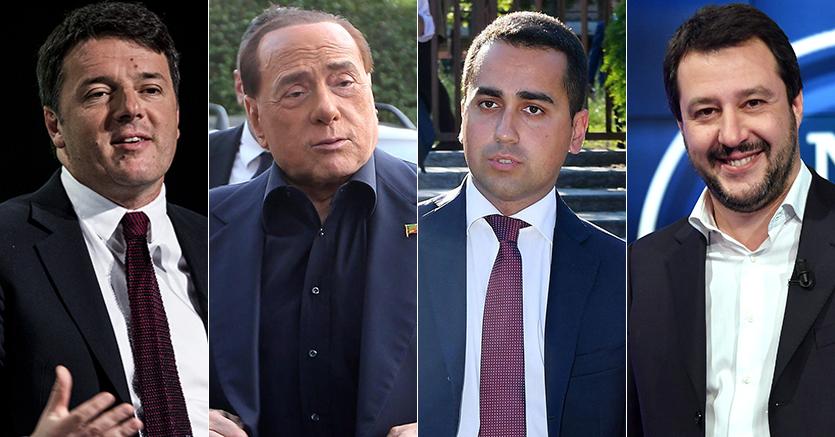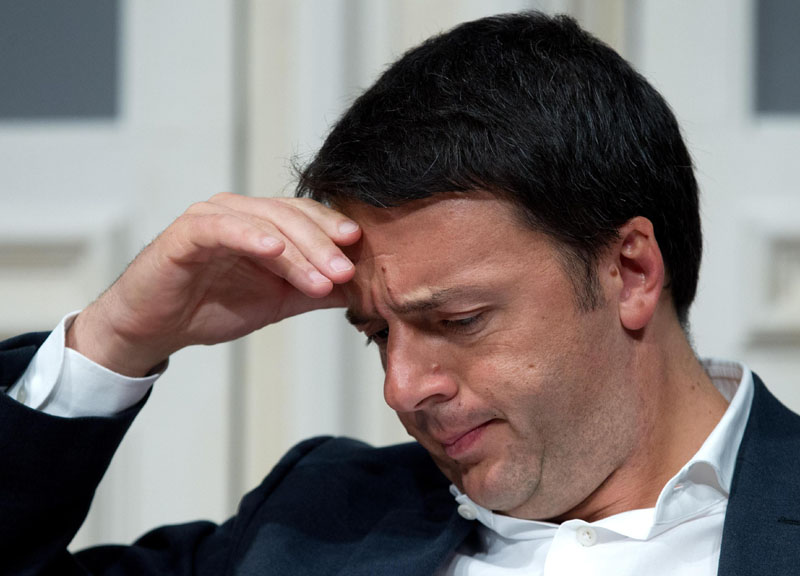Ready, set, PROMISE!
Italian election campaign begins

Fifty-two days until the Italians will cast their vote to decide their next government.
Much has changed since the last time they did that. It was 2013, Mario Monti’s “technical” government was coming to an end, the echoes of Silvio Berlusconi’s scandals were still fresh and, for the first time, the Five Start Movement really cemented itself as the third “pole” in the countries political spectrum.
Many things happened since then but this shift, the end of bipolarism, was particularly important because it broke a decades long dynamic of governing and opposition. Right now, the only thing clear for the next elections is that it’s almost guaranteed that no party will have the numbers to govern alone. To be honest, even before the rise of the Five Star Movement, the system was never a perfectly stable two-party system like the USA, but coalitions would form around the lines of the classic left/right divides.
The situation now is much more fragmented. In light of the loss of Le Pen in France and Brexit negotiations proving to be challenging for Great Britain, most euroskeptic positions have been re-evaluated. Matteo Salvini’s Northern League (which has now dropped the regional connotation in favor of the new name “The League”) has expressed his willingness to stay in the EU in order to reform it and has generally adopted a softer tone when speaking about Brussels. The Five Star Movement too recently had a 180° turn on the Euro, with candidate PM Luigi Di Maio stating that “the time has passed” for a referendum on whether or not to keep the common currency and rather that is now important to make Italy’s voice heard in the, according to him, Franco-German dominance of the EU discourse.
 The worst position at the moment seems to be occupied by the incumbent Democratic Party of former Prime Minister Matteo Renzi. The vote hemorrhage continues both to the left of it with the newly formed “Free and Equal” party lead by Senate President Pietro Grasso and to the right of it mostly to Berlusconi and Salvini’s coalition. Renzi has now set a low bar when it comes to expectations at the next elections and declared the Democratic Party aims at getting the same result as Pierluigi Bersani (now in Free and Equal) at 25% of the votes. This result was already considered pretty low at the time but now it seems Renzi would even have difficulties in reaching that percentage. The main reason for this apparent debacle is that, in spite of an economy finally on the rebound and mostly attributed to the government work, the party failed to position itself clearly on the political spectrum. Unlike Emmanuel Macron centrism, Renzi could not count on a compact parliamentary base and the power attributed to the French PM and, since the beginning, had to make numerous compromises with the right-wing parties that were backing his government. This is true for current Prime Minister Paolo Gentiloni as well, but the rhetoric of Renzi at the time was that he positioned himself as the Rottamatore (the scraper) of old politicians and politics. Furthermore, his government bore the brunt of the immigration crisis and has immensely damaged his reputation with conservative and centrist voters. This issue has also damaged the party in the eyes of left-leaning voters, since the new Minister of Interior Marco Minnniti has managed to stem the arrivals by setting up refugee camps in Libya and by restricting the freedom of several NGOs operating in the Mediterranean. On top of this, the left blames the Democratic Party for his inability to pass the new citizenship law, which would have made it slightly easier for immigrants’ children to obtain the Italian passport.
The worst position at the moment seems to be occupied by the incumbent Democratic Party of former Prime Minister Matteo Renzi. The vote hemorrhage continues both to the left of it with the newly formed “Free and Equal” party lead by Senate President Pietro Grasso and to the right of it mostly to Berlusconi and Salvini’s coalition. Renzi has now set a low bar when it comes to expectations at the next elections and declared the Democratic Party aims at getting the same result as Pierluigi Bersani (now in Free and Equal) at 25% of the votes. This result was already considered pretty low at the time but now it seems Renzi would even have difficulties in reaching that percentage. The main reason for this apparent debacle is that, in spite of an economy finally on the rebound and mostly attributed to the government work, the party failed to position itself clearly on the political spectrum. Unlike Emmanuel Macron centrism, Renzi could not count on a compact parliamentary base and the power attributed to the French PM and, since the beginning, had to make numerous compromises with the right-wing parties that were backing his government. This is true for current Prime Minister Paolo Gentiloni as well, but the rhetoric of Renzi at the time was that he positioned himself as the Rottamatore (the scraper) of old politicians and politics. Furthermore, his government bore the brunt of the immigration crisis and has immensely damaged his reputation with conservative and centrist voters. This issue has also damaged the party in the eyes of left-leaning voters, since the new Minister of Interior Marco Minnniti has managed to stem the arrivals by setting up refugee camps in Libya and by restricting the freedom of several NGOs operating in the Mediterranean. On top of this, the left blames the Democratic Party for his inability to pass the new citizenship law, which would have made it slightly easier for immigrants’ children to obtain the Italian passport.
The final piece of the puzzle is Berlusconi’s re-vamped “Forza Italia”. The billionaire and former PM has managed to lay low on the radar for a few years and has now come back to reclaim his place in the sun. At the moment he leads the only party that embodies the values of the European People’s Party and is regarded as someone who has experience in handling international relationships as well as a sort of kingmaker on the right wing side.
values of the European People’s Party and is regarded as someone who has experience in handling international relationships as well as a sort of kingmaker on the right wing side.
In this framework, the alliance game has to survive the wild promises that every party has started to promote. In the right-wing coalition, Salvini is promising a referendum on the Euro and the reduction of retirement age requirements, the abolition of the newly introduced vaccine law as well as Renzi paramount “Jobs Act”. Berlusconi is in agreement for none of this promises and said so in many interviews, nevertheless the coalition continues and together they promised a 15% flat tax. The left of “Free and Equal” too is promising a few things, most notably the abolition university taxes and a general review of the Jobs Act. The Five Star Movement, not having to worry about alliances, is also promoting some wild promises to the public. A few notable examples are the abolition of 400 laws on the first day of office as well as a big public investment plan financed with more deficit and the lowering of the retirement age too. Speaking of common promises, almost all of the parties are planning to introduce either some sort of minimum wage or of universal income. This is especially interesting because it is quite new on the political scene and, with automation and the direction of the job market, is a topic that is going nowhere on the years to come and something the citizen might actually hold them accountable for. What is absolutely sure though, is that all of these promises are going to cost an obscene amount of money, which is the reason why Europe is unlikely to approve of them and will be at the center of the negotiations with Brussels for many years to come.
All of this is the Waltz of the election campaign, but what to do after the vote? Who is going to form a government if nobody has the numbers? Both Di Maio and Berlusconi are confident they will reach the needed quorum alone, but at the moment it seems farfetched for both of them. Will we see a Große Koalition in Italy too? It is too early to tell, the numbers are still too volatile but what is sure is that Italy’s much-needed reforms are unlikely to be enacted with the next elections, or anywhere in the near future.
